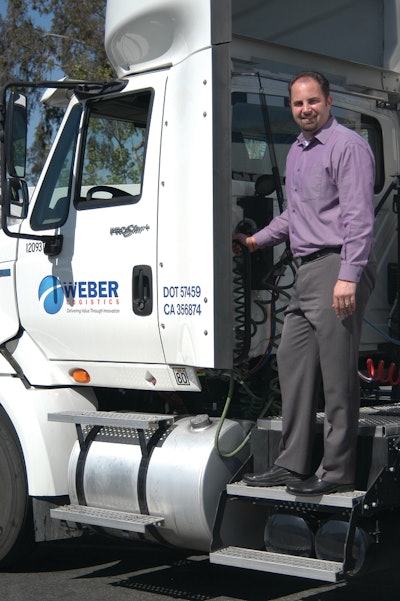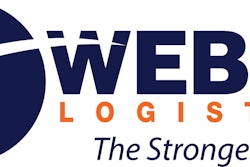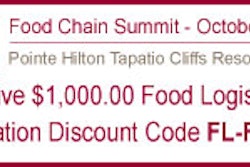
Weber Logistics is a prominent player in the U.S. West Coast logistics market and their extensive service offerings, including consolidated last-mile distribution, are a key component of many confectionary customers’ sustainable supply chain initiatives.
Temperature-controlled warehouses are likewise a requirement for handling most candy and chocolate products, and Weber has one the region’s largest networks of temperature-controlled, food grade warehouses, says David Cardadeiro, vice president for transportation. In addition to the seven temperature-controlled warehouses, the 3PL is one of the few refrigerated LTL carriers on the West Coast. Weber also provides truckload, intermodal, parcel, dedicated contract carriage, port drayage, and air cargo services.
Some of the big confectionary customers that rely on Weber for their logistics requirements, especially consolidated last-mile deliveries, include Hershey’s, Just Born, Nestle, Ghirardelli and Tootsie Roll. Typically, truckload shipments from candy manufacturing plants in the Midwest and East Coast are shipped to Weber then sorted by consignee. From there, Weber builds consolidated loads and delivers them to multiple retailers, explains Cardadeiro.
It’s not just domestic origin shipments that are handled by Weber. For German candy maker Storck (which makes brands like Werther’s Original), Weber handles all aspects of transportation and distribution from the Port of Oakland to final retail delivery. Storck sells more than one million cases of product annually in the western U.S. alone, and Weber’s consolidation program helped the company save 42 percent in supply chain costs versus non-consolidated loads.
First-rate facilities and equipment
Weber’s Rancho I facility in Rancho Cucamonga, CA is just one of the company’s 16 food grade warehouses located through out California, Arizona and Nevada. The facility handles a variety of grocery products, dry food products, confectionary and CPG products. Value-added services include rework projects, FDA inspections, USDA, time-sensitive projects and repackaging. Rancho I also operates a pick-up and delivery operation covering the Los Angeles basin with direct line-hauls to Hayward, CA, Las Vegas and Phoenix.
During a recent visit by Food Logistics, Cardadeiro provided a tour of the facility and discussed how Weber was helping support their customers’ sustainability efforts by streamlining and optimizing the transportation and distribution functions.
Rancho I is an “RFID-driven warehouse,” says Cardadeiro, “and everything is scanned into a WMS.” Weber uses Zethcon’s Synapse WMS solution. In addition, several forklift manufacturers are represented inside the facility, and the forklifts are both electric and propane-powered.
Weber’s entire fleet is equipped and monitored with Fleetmatics’ GPS Tracking solutions. “We use both the hardware and software,” says Cardadeiro. Fleet management is very important to Weber and other refrigerated transportation carriers others who operate in California, which is known for some of the most stringent emissions regulations in the country.
More than 40 power units and 85 trailers make up Weber’s truck fleet, which boasts late model tractors and the newest generation of Thermo King SB2010 Whisper units.
A commitment to sustainability
Weber has been focused on sustainability for years, says Cardadeiro. The 3PL continually looks for new opportunities to raise the bar, whether it’s through improving operational efficiencies internally or helping shipper customers reach their goals with new service offerings.
Some highlights of Weber’s sustainability achievements include:
• Since 2009, Weber has reduced its fleet carbon emissions by 37 percent—the equivalent of taking 2,047 cars off the road.
• The 3PL was one of the first members of the EPA SmartWay emissions reductions program. Since joining, Weber’s fleet has maintained the highest EPA rating available.
• Weber’s drayage solution uses only clean certified trucks at the ports and rail yards, meeting EPA standards for 2007 model clean-diesel trucks.
• Innovative lighting solutions in Weber warehouses have reduced electricity use. A combination of natural light and replacing old fixtures and bulbs with new T5 and T8 lighting has resulted in reduced electricity use in Weber’s facilities by up to 30 percent, cutting costs for customers and reducing Weber’s carbon footprint.
• Weber has purchased machinery that recycles dunnage into packing material to be used as protective filler during shipping, which greatly reduces the use of plastic filler.
• To reduce empty miles, the last mile logistics program is continuously optimized and partner carriers are used in some areas to reduce travel.
• Gas-powered material handling equipment has been replaced with battery-power units.
SIDE BAR
The Role of TMS
Transportation Management Systems (TMS) continue to evolve to meet shippers’ demands for planning and executing inbound and outbound shipments, which ultimately result in more efficient and sustainable operations.
The solutions offered by two major providers, TMW Systems and CAMS Software, are a good indication of what features shippers are looking for, how TMS solutions are impacting the transportation sector, and what new developments are in store for the future.
Grocery distribution is unique and characterized by numerous short distance trips to/from the same location. It’s a key sector for CAMS Software and the company has deployed its TMS solutions to over 85 major grocery DC’s across North America since 1998.
Prospero is CAMS Software’s latest offering. “it represents years of research and development working in concert with several of the largest grocery retailers and wholesalers in the country,” states the company. “Prospero is the only transportation software suite designed and developed exclusively to meet the specific needs of the grocery industry,” with modules for routing, dispatch, payroll, backhaul optimization, salvage optimization, tour builder (driver resource optimization), multi-site optimization, centralized dispatch, enterprise reporting, and analytics. At TMW Systems, it’s about enterprise-ready transportation management software, which is key for private fleet operators who often have to integrate within a larger corporation’s ERP and financial systems—“systems usually designed for manufacturing or retail business processes,” according to TMW. The company’s TMS offerings include TMWSuite, TruckMate, TL2000, and Innovative IES.
When it comes down to what’s next in TMS, a few developments are a reflection of a changing market demands, like “going global” to meet localized requirements. As one industry analyst noted: “As the TMS market continues to expand beyond North America and Western Europe, software vendors will have to configure their solutions to meet the local requirements of different countries. While there will be some common threads between them, a TMS in Africa, for example, will look and operate differently than one in Russia.”
TMS via SaaS or an app is another concept that is ripe for development. Small shippers, in particular, would benefit from quick, easy and affordable access to ‘TMS light’ solutions.


















